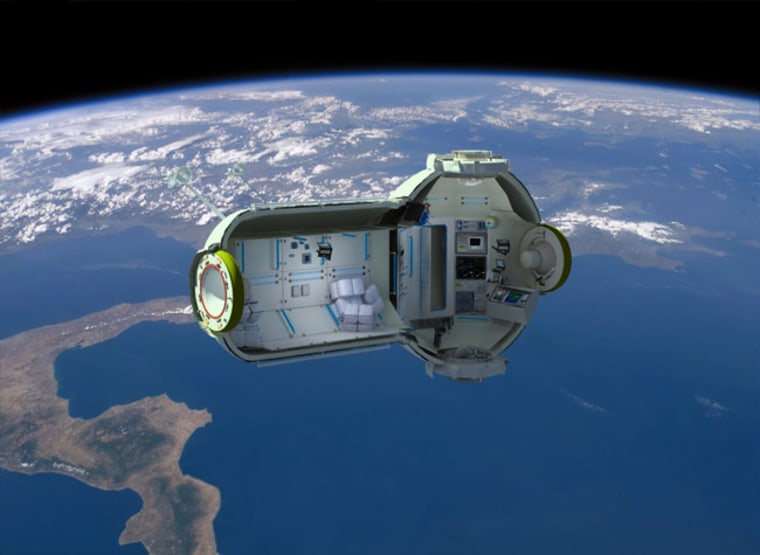Two Russian aerospace companies are teaming up to build what they say will be the "world's first commercial space station" — an orbiting outpost open to private citizens, professional astronauts and scientists. For a price.
Called the Commercial Space Station, or CSS, the orbiting space laboratory and hotel will be able to host up to seven people at a time. The venture is being planned as a partnership between the Russian companies Orbital Technologies and RSC Energia. [Illustration: Russia's Commercial Space Station]
Although the companies announced plans for the new space station on Tuesday, they did not reveal an estimated cost. The space station is expected to launch sometime between 2015 and 2016. The cost of individual trips may vary based on launch vehicle, duration and purpose of missions.
"Once launched and operational, the CSS will provide a unique destination for commercial, state and private spaceflight exploration missions," Orbital Technologies chief executive Sergey Kostenko said in a statement. "The CSS will be a valuable addition to the global base of orbital assets."
Space hotel and orbiting lab
Medical experiments and Earth observations are just some of the services the space station is expected to offer. Space tourism, Kostenko said, is another big field.
"We also have proposals for the implementation of media projects," he added. "And, of course, some parties are interested in short-duration stays on the station for enjoyment."
Moscow-based Orbital Technologies is a company of engineers, scientists and space industry veterans dedicated to opening space for private enterprise, according to its website.
RSC Energia is the largest contractor serving Russia's Federal Space Agency and has extensive experience building space station modules and spacecraft. The company built Russia's Salyut space stations, the multi-module Mir space station and major Russian elements of the International Space Station. RSC Energia also builds the Soyuz and Progress spacecraft that launch routinely to the International Space Station.
Vitaly Lopota, president of RSC Energia, said the company has 40 years of experience building space stations and has been outlining plans for the Commercial Space Station for more than 10 years.
The new space station would have an initial design life of about 15 years, Orbital Technologies officials have said. Soyuz spacecraft would ferry crews to the station, while unmanned Progress vehicles would keep it stocked with supplies.
The station will fly in an orbit about 62 miles (100 kilometers) from the International Space Station and in a similar inclination, or tilt, to make any transfers of crew or cargo between to two stations easier, the company said.
The company's description of the station did not specify its power systems. However, a company representative told Space.com that the initial module would have systems similar to the Zvezda service module on the International Space Station. The Russian Zvezda service module is equipped with solar arrays and thrusters for attitude control.
Other private space stations
The Russian announcement comes amid a major push for commercial space vehicles and rockets in the United States, where at least one company — Las Vegas-based Bigelow Aerospace — is planning commercial space stations of its own.
Bigelow Aerospace has already put two prototype space station modules in space, called Genesis 1 and Genesis 2. The modules are inflatable craft that launched in 2006 and 2007, and both remain in orbit.
The company is aiming to have a full-scale private space station in orbit and ready to receive customers by 2015. If that schedule holds, Bigelow Aerospace's inflatable space station modules would snag the title of the world's first commercial space station in orbit before the launch of Russia's Commercial Space Station.
Another company, Excalibur Almaz, based on the Isle of Man, is planning to use spacecraft originally designed for the Soviet-era Almaz space stations to offer weeklong orbital spaceflights for paying customers.
The U.S. push for privately built spacecraft comes as NASA plans to use commercial space vehicles to ferry astronauts to the International Space Station once the agency's space shuttle fleet retires in 2011.
Russian space agency takes notice
The Commercial Space Station plan has sparked interest in Russia's Federal Space Agency.
"We consider the Commercial Space Station a very interesting project, encouraging private participation," said Vitaly Davydov, deputy chief of the Federal Space Agency. "It will attract private investment for the Russian space industry."
The Russian space agency's chief, Alexey Krasnov, added that a commercial space station could serve as a backup for International Space Station crews.
"For example, if a required maintenance procedure or a real emergency were to occur, without the return of the ISS crew to Earth, habitants could use the CSS as a safe haven," Krasnov said.
As planned, the Commercial Space Station would use a universal docking system that could accommodate spacecraft from Russia, the United States and Europe, Orbital Technologies officials said. The station also is expected to accommodate China's Shenzhou space capsules, which have flown three manned missions since 2003.
The space station could serve as a springboard for even more ambitious voyages into deep space, Kostenko said.
"A short stopover at our station will be the perfect beginning of a manned circumlunar flight," he added. "Deep-space manned exploration missions planned in the next decade are also welcome to use the CSS as a waypoint and a supply station."
